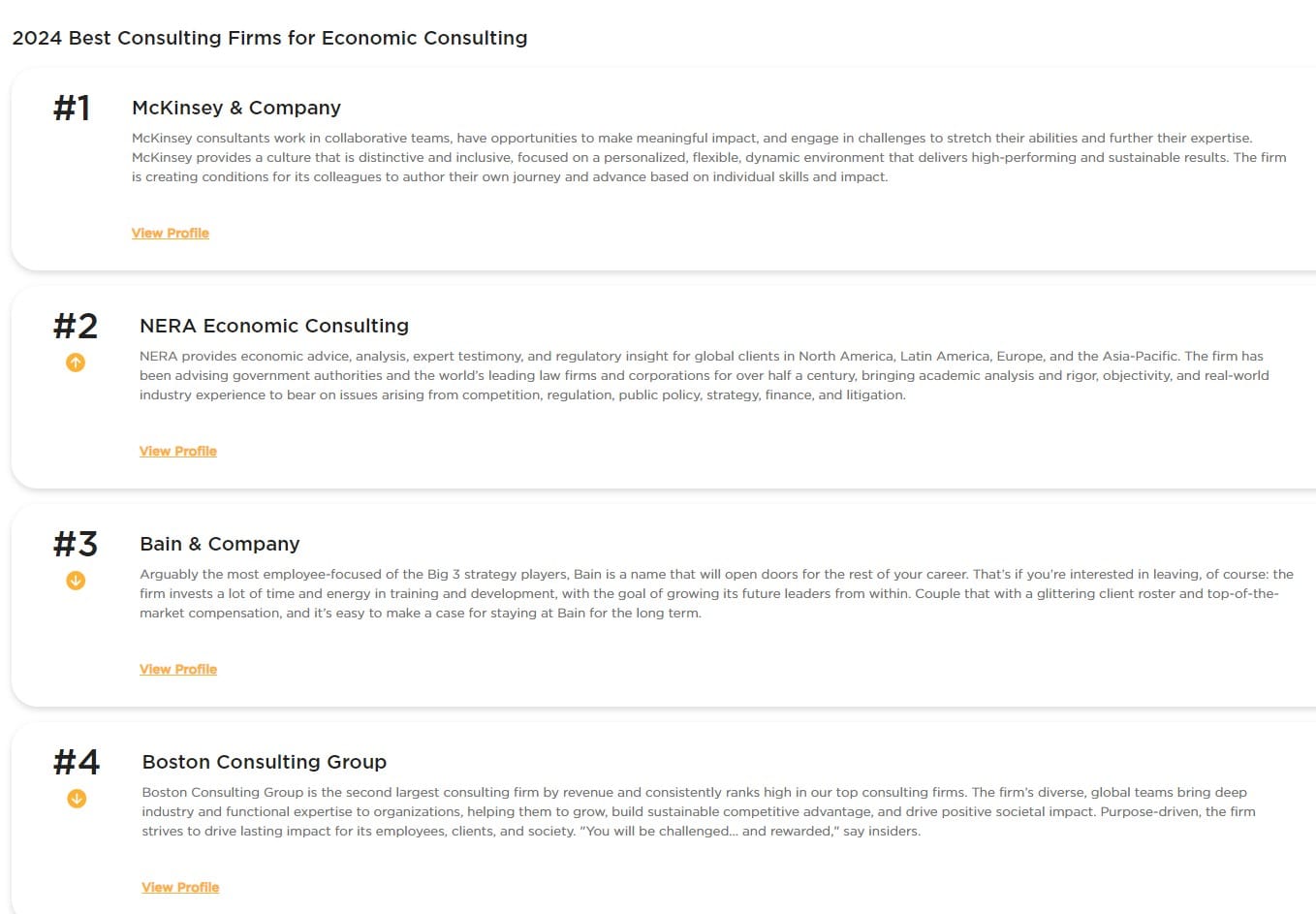Major Economic Consulting Firms: The Many Few
This guide is intended to help you understand how different economic consulting firms operate, and what to research and look out for when you are applying for any economic consulting firm in general. I will also give you a very brief list of major firms to look out for.

If you google a list of the top economic consulting firms, the websites that appear at the top will often give you a list. Below is a list of the top economic consulting firms by Vault, one of the popular firm ranking websites out there.

If you didn't notice it, I won't blame you. But three of the top four best economic consulting firms in that list, are not economic consulting firms at all - they are management and business consulting firms. NERA is the only "pure" economic consulting firms in that list of four. Some of these business consulting firms in the list have acquired some smaller Economic consulting firms in the last decade (McKinsey acquired Vivid Economics around 2021), but these acquired companies have kept their name unchanged. And I have seen this in many such lists, across many platforms. This just goes on to show that even the industry curators don't have much of an idea about economic consulting firms - and I don't blame them, this information is not that obvious on the internet either.
Economic consulting is a generally concentrated industry, with a few big players dominating the market. That line reads like an antitrust complaint, but it is true. And chances are you might not even have heard of even the big ones if you did not work in the industry, or have been hunting for interviews for your next job. In the last two to three decades, some few new names have popped up in this list of firms though - which is a great sign that the industry is getting a lot more traction globally.
I will give you a list of the major Economic Consulting firms to look out for at the end of this guide. But my primary aim with this article, is to introduce you to how Economic Consulting firms work in general. This guide is intended to help you understand the different possibilities of working in the economic consulting industry, how different firms operate, and what to research and look out for when you are applying for any economic consulting firm in general. But to keep with tradition, at the end of this article, I will give you a very brief list of major firms to look out for.
General Patterns of Economic Consulting Firms
General descriptions of most economic consulting firms in any such list might seem pedestrian. But if you look closer, there are some common patterns we can understand about Economic consulting firms in general. After all, we as economists have a weakness for spotting patterns.
- Big City Locations - The offices of most economic consulting firms are located in large cities, with populations exceeding around half a million people. There might be exceptions with some firms having offices in smaller cities, but generally this holds true. So if you want to work in a small city, or don't want to move to a bigger city, your options might be highly limited.
- City Choices - Most of these economic consulting firm offices are clustered around Washington D.C, New York, Boston, London etc. This is because many of their law firm clients are located in these cities. Washington D.C especially is a hot spot for government clients and if you work in regulation, that is the kind of place where you want your office to be.
- Size - All of these firms are mid-sized with the employee numbers between 100 and 1,000. Usually these firms are smaller, with the employee headcount being less than 200 per office. This creates a rather small work environment where everyone in the office generally knows each other, and opportunity for increased visibility is much higher than in some large firms.
But in spite of these similarities, there are some differentiating factors between some of these firms, which make them starkly different from some others.
- Practice areas - Most of the economic consulting firms practice across multiple practice areas that are most lucrative for the business (Mergers, Finance, life sciences etc). We discuss some of these practice areas in detail in our article here. But some consulting firms specialize in some sectors of the industry compared to others. This can be a crucial differentiator, especially for candidates who are going for interviews to understand what specialization they will be working in if they do get hired.
- Plaintiff vs Defendant litigation - Some firms exclusively work with plaintiffs, as part of their policy and values. While some other firms work on both sides of the fence, and some others mostly work with defendants although not exclusively. This can be an important considerations if you as a prospective applicant have certain preferences about the role you want to play in society. Neither is bad, just preferences.
- General company culture - Economic consulting firms can be relatively small, with around 20 employees, or much larger, with up to a 1,000 employees. There are some new firms, and some firms that have been around for more than half a century. Each firm has a very different culture within it. Newer firms tend to be more like a startup, with very hands on work with you having to dabble in everything from business pitches, analysis, report drafting, client management etc. Older firms are more structured in the responsibilities, but come with their own challenges. This is also important to know when considering the firm you want to work for.
Clients, Opposition and Courts - The Main Cast
There are three major players involved in every economic consulting engagement. These involve the client we work for, the opposing side, and the courts that decide which side wins finally.
- The Client - The client, as obvious as it sounds, is the firm footing the bill. This could be some big company looking for strategic or regulatory advice, a federal agency or government body or a group of injured group of people in a class action. But in almost all cases, the end-client hires a law firm and then the law firm hires the economic consultant firm. So even though the end-client is different, the direct client for an economic consulting firm is usually the law firm. And its usually rare for the client to have any direct interaction with the economic consultants.
- The Opposing Side - The opposing side in expert litigation is, as it sounds, the side you are fighting against in the engagement. So if you are a plaintiff in a litigation case, the opposing side is the combined team of lawyers and the economic consulting team representing the defendant. But usually in the initial stages of the engagement, each side's economic consulting firm is kept a secret. At some stage of the process, the economic consulting firms exchange their expert reports to be reviewed by the other side around which is usually when the opposing expert consultants are made public. This is usually one of the most stressful and precarious stages of the engagement. The firms exchange all the data, analysis and code files - and there are infamous stories about a junior analyst's careless mistake resulting in a wrong coefficient nullifying the entire expert report's validity!
- The Courts - The court is what decides the outcome of the engagement. This is the battlefield where the teams strike against each other, hoping to lay that winning blow. And in a majority of the cases, at some stage the case goes into settlement, where both parties avoid long drawn litigation and reach a compromise. But during the whole process, and if then the case doesn't reach a settlement, the court is what decides what each step of the process proceeds like. So at the end of the day, the court and the judge are the decision makers, and so you as an economist need to explain complex stories in a convincing but simple manner for a judge to understand. This can't be stressed enough, because throughout the engagement process there will be constant stress to detail the report out to the tiniest detail to make things simple, easy to read and understand.
Major Firms in Economic Consulting
Now that we have tried to understand a bit about how economic consulting firms work in general, lets take a look at a few big known names within the industry. This is no exhaustive list, and there are some names, big and small, that have missed this list. And I am not going into any big detail here - its all something you can find with a simple google search.
- NERA Economic Consulting - National Economic Research Associates, or more popularly know as NERA, is the oldest and a very highly reputed economic consulting firms in our list. Part of the larger Marsh McLennan group, NERA has more than 700 employees and has an international presence across 25 offices. NERA was founded in 1961, and they work across many economic consulting verticals including Mergers & Acquisitions, Antitrust, Valuation, Litigation, Arbitration and Securities.
- Charles River Associates (CRA) - Founded in 1965, CRA is one of the older and larger economic consulting firms in the world, employing more than 1,000 consultants at the time of writing. CRA is involved in all kinds of economic consulting work streams including Antitrust and Competition, International Arbitration, Mergers & Acquisitions, Financial Litigation, Regulation and many more. CRA has its headquarters in Boston, but has office locations in many countries around the world.
- Cornerstone Research - Cornerstone research was founded in 1989, and is a large economic consulting firm with more than 900 employees at the time of writing. They have offices all around the world including Boston, Chicago, Washington D.C and London. Their practice areas include antitrust, merger investigations, securities litigation and international arbitration.
- Analysis Group - Analysis Group is one of the largest international economics consulting firms, with more than 1,200 professionals across 14 offices in North America, Europe, and Asia. Founded in 1981, Analysis Group's practice areas include Antitrust & Competition, Government & Corporate Investigations, Intellectual Property, International Arbitration and Valuation.
- Compass Lexecon - Headquartered in Chicago, Compass Lexecon is one of the leading economic consulting firms in the world. Founded in 1977, Compass Lexecon has more than 800 professionals in more than 20 locations all around the world. Their practice areas include Antitrust & competition, securities and financial markets, intellectual property and mergers & acquisition
- Brattle Group - Another highly reputed firm in our list, Brattle Group was founded in 1990. Brattle employs more than 500 consultants, and has locations in many major cities across the globe. Brattle works across various practice areas including antitrust and competition, bankruptcy, intellectual property, mergers & acquisitions and securities class actions.
- Frontier Economics - Now one of the largest economic consultancies in Europe, Frontier Economics was founded in 1999. They have many practice areas in which they specialize including competition, public policy, international trade, mergers and antitrust. They have multiple offices all across Europe and in London.
- Bates White - Founded in 1999, Bates white has only one office location in Washington D.C with more than 300 employees. Recognized by many competition review publications in reputation, their practice areas include antitrust, bankruptcy, class actions, intellectual property and international arbitration.
There are so many more firms to list, but we are going to cut this list short and stop here. There are so many smaller players as well who are worth noting, and they stand out with their innovative approaches and focused practice niches. The list is going to be too long to include them, at least for now.
So hopefully you learnt a thing or two about Economic Consulting firms in this article. Economic Consulting firms usually have many similarities, but yet each firm is so different from each other in many ways, which help each of them stand out in this highly competitive industry. We will discuss more about economic consulting industry and firms in the coming articles, so subscribe to know when we do!
Keep Learning!
